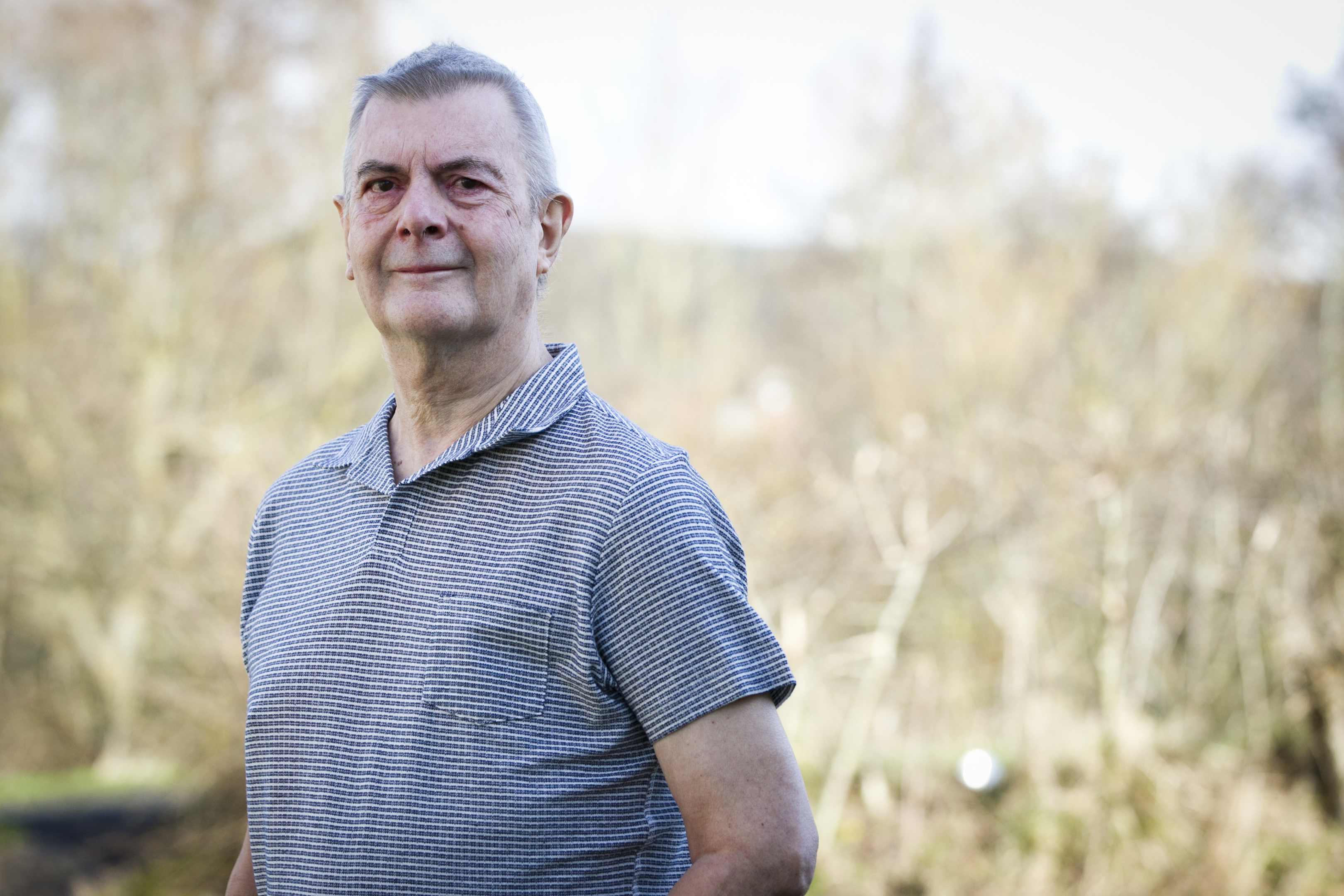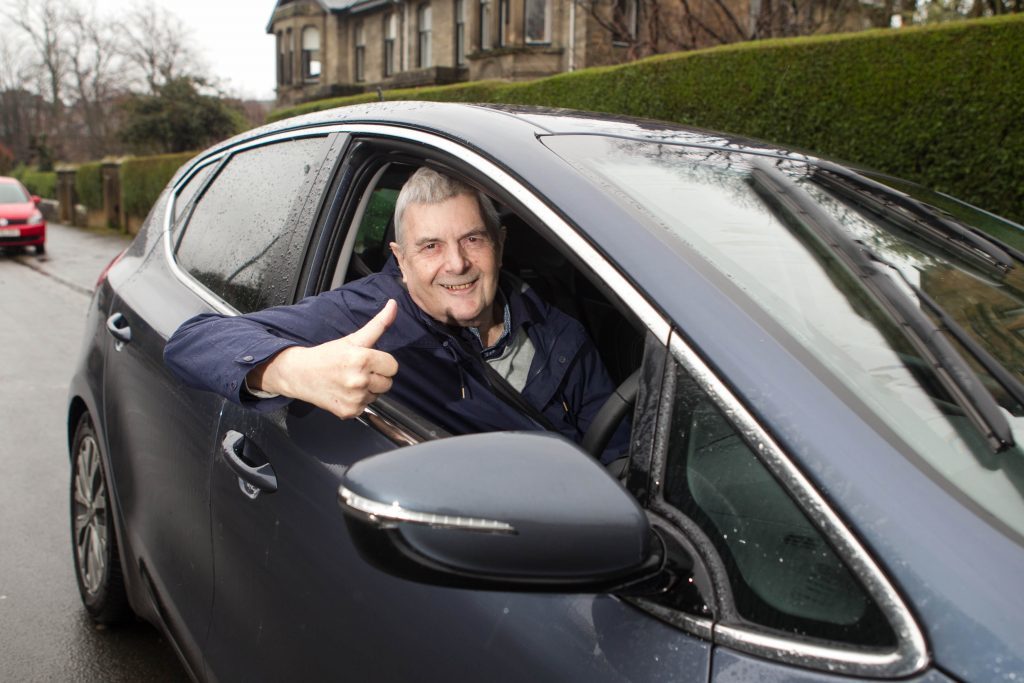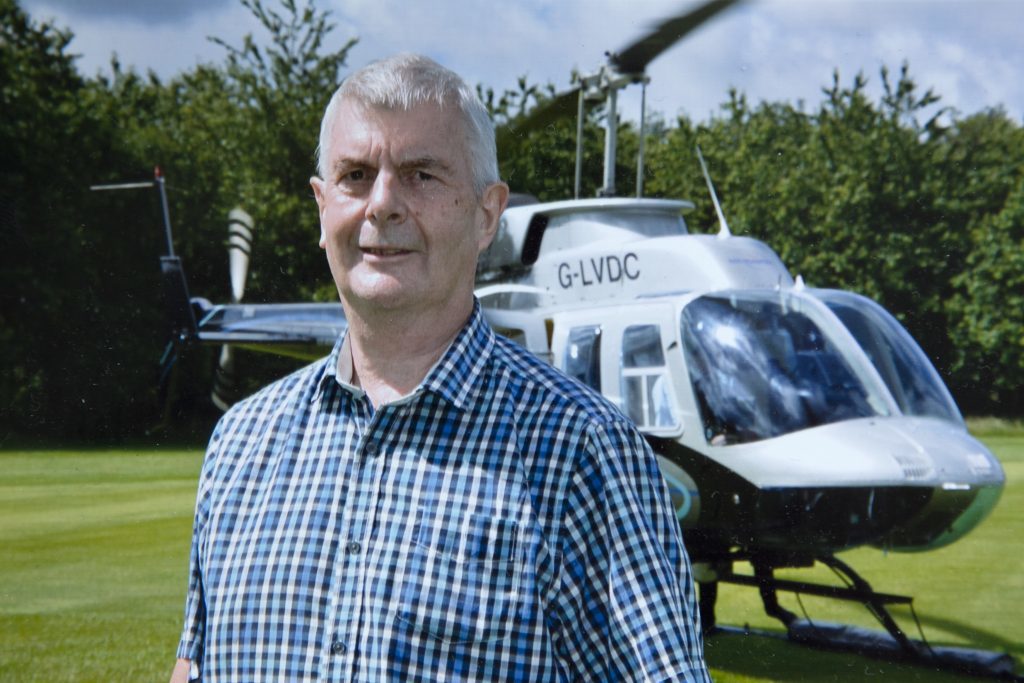
FACING up to the prospect of spending the rest of his life confined to a wheelchair, David Blaikie was close to giving up.
He had beaten breast cancer three years earlier, but this time the outlook wasn’t so bright.
The former civil servant had been rushed to hospital after shattering his humerus and fracturing his elbow in a fall in May 2013.
It was then that doctors discovered a large tumour in his lower back, pushing against his spine. After being diagnosed with bone cancer, and undergoing a course of radiotherapy, he was told it was unlikely he’d ever walk again.
David, who was then 66, had been walking around 30 miles a week with his dog since retiring. It was a devastating blow.
His active lifestyle was replaced with one involving round-the-clock care at his home in Galston, East Ayrshire, where he needed help with even the most basic of tasks like getting out of bed, getting washed and dressed.
But despite his grim prognosis and being paralysed from the waist down, there remained a steely determination within David.
He kept telling himself he would get back on his own two feet – and in April 2014, 11 months after his fall, he forced himself out of bed and took six steps around his room with the help of a mobility device.
It was a breakthrough.
The next day the grand-father-of-two ordered a set of crutches online and, within a year, David had progressed to walking with only a stick for help and was deemed fit enough to set off on a solo driving trip around Ireland.
His recovery was so remarkable he was likened to Lazarus by a cancer specialist and he has been hailed an inspiration by the staff he worked with at the Ayrshire Hospice.
“I was just so frustrated lying in bed,” said David, now 70. “I attended the Ayrshire Hospice every week to do exercises and I knew I had to walk again.
“When I got out of bed the first time, I was at the stage where I wasn’t completely paralysed, I just couldn’t take a step without falling over.
“When I managed to get myself up, it astounded me. A new life started for me then.
“Being called Lazarus made me feel really good, there were a lot of cheers, tears and hugging when people saw me back walking.”
Driving has always been a passion of David’s and after his successful trip to Ireland, he set off on an even longer European tour around nine countries in September 2015.
Among the many people amazed by David’s remarkable recovery are the staff at the Beatson West of Scotland Cancer Centre in Glasgow.
Consultant clinical oncologist Dr Graeme Lumsden has been seeing him as a patient for years and said his transformation was remarkable.
He underlined the scale of his recovery by likening him to Lazarus, the biblical figure restored to life by Jesus four days after his death.
“If you asked any oncologist how many times they have seen somebody back walking and independent after having no power in their legs, they would tell you how rare this is,” he said.
“In my 12 years as an oncologist, there was only one other occasion when I was training when I can remember anything similar, that’s why he got called Lazarus.
“He absolutely surprised us, beyond a doubt. We’ve seen him a lot over the past few years and you could tell as he got power back in his legs, he was determined to keep getting more mobile.
“He would come in with a stick one day and the next he’d come in with a bruise on his face or arm because he said he’d been out walking up a hill and I’d say ‘whoa, take it easy!’.
“He is an inspiration.
“At times like this the NHS can be applauded for the huge team of people who were involved, including my consultant colleague Dr Lucy Scott, clinical nurse specialist Lynn Bryson, chemotherapy nurses and many others who provide vital input into the care of patients.”
David says a positive mindset has played a key role in his revival but also acknowledges there are many people who helped him along the way.
He said that without the support of his family – including his ex-wife Marjorie and daughters Sharon and Lorna – he wouldn’t have mustered the courage to try to get his old lifestyle back. During the tough time from his first steps around his bedroom to regaining his independence he also received a lot of help from the Ayrshire Hospice and is still a regular visitor there.
David spoke at the Scottish Parliament on behalf of the hospice last November about the good work they are doing from a patient’s perspective.
Hospice physiotherapist Heather Hardie said: “David is a motivated, driven man who knows what he would like to be able to do and makes every effort towards achieving this.
“All that myself, Claire Miller and Claire Goldie did as physiotherapists was give him the chance and means to try within a safe environment to stand and walk again.
“David did all the hard work. When he faced knockbacks his attitude was that he would rather try and fail than not try at all. His positive attitude is infectious.
“His story is why we do the job we do and inspires us to continue to offer all we can to patients.”
A course of chemotherapy followed David’s first cancer diagnosis in November 2009 and shrunk the tumour enough for a successful operation to be carried out in May 2010.
Last October, David was told he was facing a third cancer battle when a tumour was found in his liver.
But as ever, he remains positive. “I can’t be anything but positive now,” David said.
“When I was lying in my bed waiting for my carers, I couldn’t have imagined I’d be back on my feet again and getting these chances to see the world.
“I realise I’m lucky, in two years of going to the hospice, I lost 12 friends.
“I can only count my blessings and just look forward to the future with the adage ‘life is great’.”
Timeline
November 2009: David is diagnosed with breast cancer. David himself admits he had ignored a lump above his left breast for too long. When he shows his GP he is immediately sent for an appointment with an oncologist at Crosshouse Hospital, Kilmarnock.
December 2009-April 2010: David undertakes course of chemotherapy during which time tumour is reduced to less than half the size. This opened the door to surgery to remove the tumour in May 2010. A week after the surgery he collapses while trying to get to the toilet and the next thing he remembers is waking up in bed back in hospital with a sea of faces around him and needles and drips everywhere. A serious case of internal bleeding caused his blood pressure to be dangerously low. He is sent for surgery, is then transferred to a high dependency ward, then a normal ward and is released home a week later.
January 2013: After having pains in his lower back, David visits his GP. He is diagnosed with a strained or torn muscle and prescribed painkillers. The pain became worse and walking his dog became increasingly difficult as his stamina reduced.
May 31, 2013: After a particularly painful night, David calls for a GP to visit his house. Later, following an examination, he has a serious fall and is unable to get up. After some tests it turns out he has broken his left humerus and fractured his left elbow. A scan reveals bone cancer caused a large tumour to form at the base of his spine. He is given radiotherapy at the Beatson and is returned to Crosshouse Hospital where he’s told it’s unlikely he’ll be able to walk again.
April 21, 2014: Less than a year after his fall, which had been spent either in a wheelchair or a hospital bed in his own home, David gets out of bed with the support of a mobility device and manages a few steps around the room.
April 22, 2014: David orders crutches online the next day and over the next year, his mobility continues to improve.
March 2015: Following a year of steady improvement in his mobility, David travels to Ireland for a driving holiday.
September and October 2015: David heads off on a long trip around continental Europe.
September 21, 2016: David speaks at the Scottish Parliament about the work of the Ayrshire Hospice.
October 25, 2016: Doctors diagnose a tumour in David’s liver. Injections and tablets are prescribed but medics are optimistic about his chances.

Enjoy the convenience of having The Sunday Post delivered as a digital ePaper straight to your smartphone, tablet or computer.
Subscribe for only £5.49 a month and enjoy all the benefits of the printed paper as a digital replica.
Subscribe
